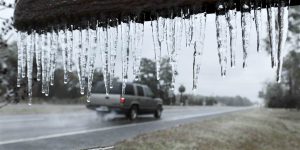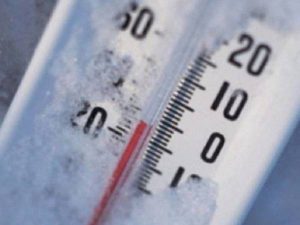People in Florida might not consider planning and preparing for winter weather events because of it’s normally mild temperatures. However, some northern Florida regions experience temperatures below freezing and occasional snow and ice storms during the winter months. Many Florida homes lack adequate heating and insulation for dealing with sub-freezing conditions. Loss of heating systems because of power loss can create dangerous situations for family members. There is also a risk of electrical outages and frozen or broken water pipes. Traveling may not be safe with ice or debris on local roadways as well. It is important to be prepared for winter weather events as well as know heating fire safety.

Quick Facts
- Florida winter weather events are fairly rare; however, they can and do occur. The latest occurrence was January 3, 2018 when a winter “cyclone bomb” dumped freezing rain in North Florida, causing power outages and downed trees.
- In March 2016 Florida experienced a hailstorm in Orlando with 1-foot drifts.
- In February 2010, some parts of northern Okaloosa County reported 4-6 inches of snow.
- During the winter of 1989-1990, 26 Floridians died of hypothermia.
- Along Florida’s coast, snowfall is even rarer (Pensacola recorded 3 inches of snowfall in 1895).
Winter Weather Event Preparation
- Make sure to have coats, gloves, and hats for all family members.

- Stock up on batteries and flashlights in case of a power outage.
- Charge your cell phone(s), tablets, laptops, etc.
- If you or someone you know requires oxygen or is electronically dependent, have a plan of action.
- Have enough prescription medication for a week in advance.
- Keep extra cash on hand.
- Fill your car(s) with gas.
- Ensure you have a week’s supply of non-perishable food, with a manual can-opener and water on hand.
- If you live outside of the city limits and have water wells, fill your bathtub(s) with water.
- Turn your refrigerator and freezer to the coldest temperature.
- Wrap exposed exterior pipes with rubber insulation.
- Bring all pets and animals indoors, also cover plants outside to avoid frostbite.
Heating Fire Safety
It is extremely important to maintain a fire-safe home this winter.
Space Heater
 Keep anything that can burn, such as bedding, clothing and curtains at least 3 feet away from the heater.
Keep anything that can burn, such as bedding, clothing and curtains at least 3 feet away from the heater.- Make sure the heater has an automatic shut-off, so if it tips over, it shuts off.
- Turn heaters off when you go to bed or leave the room.
- Plug portable heaters directly into outlets and never into an extension cord or power strip.
- Only use portable heaters from a recognized testing laboratory.
Fireplace
- Keep a glass or metal screen in front of the fireplace to prevent embers or sparks jumping out.
- Do not burn paper in your fireplace.
- Put the fire out before you go to sleep or leave your home.
- Put ashes in a metal container with a lid, outside, at least 3 feet from your home.
Wood Stove
- Make sure your wood stove is 3 feet from anything that can burn.
- Do not burn paper in your wood stove.
- Put the fire out before you go to sleep or leave your home.
- Have your chimney inspected and cleaned each year by a professional.
Furnace
- Have your furnace inspected each year.
- Keep anything away from the furnace that can burn.
Kerosene Heater
- Only use kerosene heaters from a recognized testing laboratory.
- Make sure the heater has an automatic shut-off, so if it tips over, it shuts off.
- Refuel your cooled heater outside.
For more heating fire safety information and free resources, visit www.usfa.fema.gov/prevention/outreach.
Winter Weather Guidelines
- Allow a small stream of water to run from faucets to reduce risk of frozen pipes.
- If you lose power, unplug all appliances

- Operator generators safely.
- Never burn an open fire indoors unless it is in a properly ventilated fireplace.
- Never burn charcoal fire indoors.
- Keep refrigerator and freezer doors shut as much as possible.
- Do not hesitate to seek shelter at locally safe spots. Contact your county’s Emergency Management Office for locations.
- Do not travel if it is not an emergency. Preparation is very important to prevent unnecessary outings that could lead to becoming stranded.
The 5 Cold Weather Preparedness P’s
- Protect People: Dress in layers and wear gloves and hats.
- Protect Pets: If cold weather if forecasted, bring pets indoors to stay warm.
- Protect Pipes: Cover exposed pipes and have outside faucets dripping slowly.
- Protect Plants: Know the needs of your plants. Cover sensitive plants from the cold with old sheets or burlap secured with clothespins.(avoid using plastic)
- Practice Fire Safety: Only us safe heating sources inside. Be attentive to any open flames inside the home.
If you are anticipating a winter weather event, do not wait to take action. It is far better to be prepared and nothing happen than to not be prepared and stuck in an emergency. Adequate and timely preparation is the only way to survive a winter weather event. Plan ahead and be prepared!
If you would like more information about storm preparation, visit edis.ifas.ufl.edu or contact your local extension office.
Jana Hart- Extension Agent- 4-H, FCS
 0
0

 Keep anything that can burn, such as bedding, clothing and curtains at least 3 feet away from the heater.
Keep anything that can burn, such as bedding, clothing and curtains at least 3 feet away from the heater.

